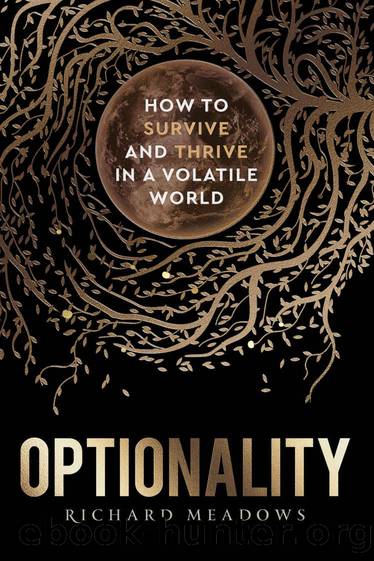Optionality: How to Survive and Thrive in a Volatile World by Richard Meadows

Author:Richard Meadows [Meadows, Richard]
Language: eng
Format: epub
Publisher: Thales Press
Published: 0101-01-01T00:00:00+00:00
INTRINSIC INTERESTS
"Where do you get your ideas?"
This a bewildering and depressing question, and any aspiring writer who has to ask it is doomed to failure. Every tiny facet of the world is so ridiculously fascinating that youâd have to be deaf, dumb, and blind not to notice. If you want to be interesting, be interested.
Lack of intrinsic interest is a big red flag for learning any skill. In the case of general competency, to the extent that something feels like a chore, the formula for deciding whether you should insource it becomes that much less attractive.
In the case of non-negotiable skills, stickability is everything. You have to find something you actually enjoy, or can bake into your overall sense of identity. This is why playing a sportâeven a solo sport, where you compete against yourselfâis much better than âexercisingâ.
In the case of a talent stack, the ideal is to forge a career that intersects with one or more of your hobbies, and make the notion of work-life balance obsolete.
Following your interests and hobbies wonât necessarily advance your career, or even pay off in any externally measurable way. Iâm not sure how Iâm going to leverage my skills as an amateur guitarist who can't quite make it through a song without forgetting at least one of the chords. With that being said, playing music has helped me understand maths a little better. It has expanded the range and resonance of my writing (see what I did there). Iâve bonded with people who I otherwise wouldnât have. Perhaps the plasticity of my brain has improved in some small way.
Most importantly, itâs fun.
Forget all the strategic stuff for a second. If you lived in a post-scarcity world, and the only thing that mattered was maximising your own enjoyment, how would you choose to spend your time?
A truly self-interested person would still end up acquiring a bunch of skills. This is partly because it provides a lot of life satisfaction: we donât remember how we felt in the momentâblistered fingertips, covered in grease in the belly of the engine, cursing and cramped, lungs heavingâbut we do remember the sense of achievement in standing back with a beer in hand to survey our handiwork.
Active leisure is also a rich source of experiential pleasure: the endorphins of a runnerâs high, the joy of curling up with a fascinating book, surfing the trance-like state in the sweet spot between boredom and difficulty. The simplest argument in favour of acquiring broad skills is that it's a reliable way to get into these immersive flow states, and escape the usual trap of fixating on external outcomes.
So thatâs the first measure of knowledge capital: the breadth and depth of your skills. The second measure is the quality and quantity of your ideas.
Download
This site does not store any files on its server. We only index and link to content provided by other sites. Please contact the content providers to delete copyright contents if any and email us, we'll remove relevant links or contents immediately.
The Black Swan by Nassim Nicholas Taleb(7110)
Bad Blood by John Carreyrou(6611)
Pioneering Portfolio Management by David F. Swensen(6289)
Millionaire: The Philanderer, Gambler, and Duelist Who Invented Modern Finance by Janet Gleeson(4469)
Skin in the Game by Nassim Nicholas Taleb(4239)
The Money Culture by Michael Lewis(4198)
Bullshit Jobs by David Graeber(4179)
Skin in the Game: Hidden Asymmetries in Daily Life by Nassim Nicholas Taleb(3992)
The Wisdom of Finance by Mihir Desai(3735)
Blockchain Basics by Daniel Drescher(3574)
Liar's Poker by Michael Lewis(3441)
Fooled by Randomness: The Hidden Role of Chance in Life and in the Markets by Nassim Nicholas Taleb(3108)
Hands-On Machine Learning for Algorithmic Trading by Stefan Jansen(3067)
The Intelligent Investor by Benjamin Graham Jason Zweig(3036)
Mastering Bitcoin: Programming the Open Blockchain by Andreas M. Antonopoulos(3035)
The Power of Broke by Daymond John(2975)
Investing For Dummies by Eric Tyson(2948)
You Are What You Risk by Michele Wucker(2783)
Market Wizards by Jack D. Schwager(2698)
